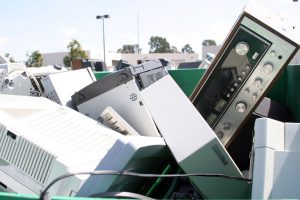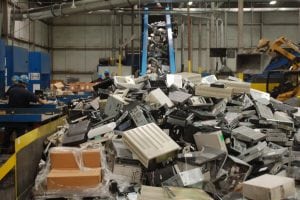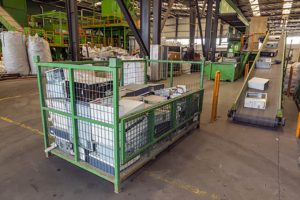
California regulators plan to lower the fees consumers pay to fund electronics recycling. The issue? The state is accumulating too much money.

California regulators plan to lower the fees consumers pay to fund electronics recycling. The issue? The state is accumulating too much money.
 California’s e-scrap program took a hit when ECS Refining closed in June 2018, but it was anything but a critical blow. Other local and national e-scrap companies took up the slack.
California’s e-scrap program took a hit when ECS Refining closed in June 2018, but it was anything but a critical blow. Other local and national e-scrap companies took up the slack.
 A major retailer will pay $7.4 million to settle allegations it again broke California law by illegally tossing used electronics and hazardous materials in the garbage.
A major retailer will pay $7.4 million to settle allegations it again broke California law by illegally tossing used electronics and hazardous materials in the garbage.
 Additional data protection and privacy laws are coming to San Francisco and elsewhere in the Golden State.
Additional data protection and privacy laws are coming to San Francisco and elsewhere in the Golden State.
 Whole Foods Market California and two companies it owns will pay over $1.6 million to settle allegations they improperly disposed of electronics and hazardous wastes.
Whole Foods Market California and two companies it owns will pay over $1.6 million to settle allegations they improperly disposed of electronics and hazardous wastes.

Material at the Mesquite, Texas ECS Refining facility. E-Scrap News file photo.
E-scrap processor Dynamic Recycling has signed a deal to buy assets from bankrupt company ECS Refining. Meanwhile, environmental and cost complications are popping up around facility cleanup efforts.
 It’s been 15 years since California’s e-scrap program was launched, and those years have brought significant changes to the end-of-life device stream. Now, administrators of the country’s first state program have adopted a vision for the future.
It’s been 15 years since California’s e-scrap program was launched, and those years have brought significant changes to the end-of-life device stream. Now, administrators of the country’s first state program have adopted a vision for the future.
 Processors handling non-CRT devices will be paid 60 cents a pound by the state of California, a 22 percent increase over their current payment rate.
Processors handling non-CRT devices will be paid 60 cents a pound by the state of California, a 22 percent increase over their current payment rate.
 Processors in California will soon receive reimbursement rates that vary based on the type of device recycled. Regulators this week approved a variable payment rate system in response to the changing end-of-life electronics stream.
Processors in California will soon receive reimbursement rates that vary based on the type of device recycled. Regulators this week approved a variable payment rate system in response to the changing end-of-life electronics stream.
Continue Reading
 The Home Depot will pay nearly $28 million in a California settlement involving disposal of e-scrap, batteries, household hazardous waste and intact customer information.
The Home Depot will pay nearly $28 million in a California settlement involving disposal of e-scrap, batteries, household hazardous waste and intact customer information.

